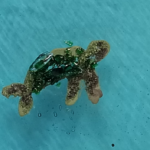by Raymond Anganes
Neon lights stretched out for all eternity, and the great hollow conduit ran in a ring around the cosmic city. Marina reached out with her hydraulic appendages and dragged herself further and further into the unending cylindrical corridor. Each pulsing, wall-mounted cable full of glowing liquid bathed her home in a different color of neon light, and scanners on Marina’s body ensured the cables’ integrity as she made her rounds.
Billions of Terrans slept in their pods as a skeleton crew of millions kept the city in order. They were sorted by age, with the oldest set near deck zero of the city and the pods of humanity’s youngest suspended hundreds of meters above the conduit, relative to the gravitational force exerted upon Marina. Motorized rail systems shuffled the pods according to the will of the city’s gods, waking those that needed to be brought back to life and re-shelving those who needed to be put to sleep again. Even these sleepers needed caretakers, pairs of watchful eyes, and so Marina lent two of her own. She watched them slumber through the thick silicone walls of the conduit, only waking when the powers-that-be decided it was time.
Model number 3 was painted in red on Marina’s alloy thorax, and her steel body’s industrial black and yellow color scheme brought attention to all of the identifying marks she had been given. Her eight hydraulic-driven legs anchored her stably at the center-point of the conduit, and she ran her two arms carefully over the delicate machinery that her creators had tasked her with maintaining. Up ahead was a red light that signified a leak in the cable. Do not worry, she thought. No reaction will take place.
There was no air in this conduit, nothing but pure helium gas. Any leak or release of substance from the pipelines and cables would be suppressed by the gas, safeguarding the surrounding systems. She scanned the thousands of cryo-sleep modules that surrounded the conduit and ensured their occupants still thrived. All of the data flowing through her system was enough to fill entire groups of storage networks, but Marina’s creators had prepared her for such processing operations. No outside systems contributed to her power supply, and the continually-refilling battery cells in her core would last for eons. The whole city could disintegrate and she would simply float through space until the gravity of some celestial being dragged her to its surface.
Her processors whirred as she checked the status of those under her care. As quickly as it was cached, analyzed, and sent out to other networks, the data was deleted. So many names, bios, medical charts, and government identification photos flooded through her as her hydraulic legs pressed onward at their slow, methodical pace. Schedules were written in stone aboard the great celestial city with no exceptions made; a certain number of human beings were released from their state of suspended animation every time the population of the previous generation grew sparse. Reproduction was only permitted when new cryo-sleep chambers opened up.
To all those who demanded that they be given the same rights that they had on Earth, administration replied that salvation was never meant to be a state of total freedom. Every human being was given the opportunity to survive the dying of the stars. For those who valued their freedom over their lives, they were given the option of staying back on Earth. Marina often wondered what their final days looked like. She had made the trip around the great conduit over seven hundred times since her creation, and the planet called Earth had frozen before she fully walked the route for the first time. If years were still a relevant means of measuring one’s length of existence, she calculated herself to be forty seven years old.
Old, she mused. The humans in these pods are old. That man is one hundred thirty two years old, but he is given the designation of eighty five years old. He witnessed the dying of earth’s sun at the age of thirty five. One’s cryo-sleep age was never discussed among the humans; they preferred to speak only of the years they experienced. And so what of cyclical circadian sleep? she wondered. Suspended animation was not permanent; it greatly prolonged the lifespan of organic life-forms, but eventually their bodies would give out despite the cryogenic processes that sustained them. They age in their sleep. What a frightening idea, to be made of flesh and bone. She continued her scans as she approached the ruptured cable ahead.
They slept and slept, and yet, she pulled a sample from her database of sleepers, Dr. Francois Richard is only fifty three years old. Marina’s internal processes hiccupped each time she used earth-years as a unit for newly-taken measurements, as though some part of her design was based in the new rules of time set by this dead universe. She wondered if there were things she was disallowed from thinking about. Her creators were all in cryo-sleep by the time she came online, and so Marina lived alone with these thoughts.
No other beings, robotic or organic, existed in the conduit, and the humans lived a distant life from hers, never communicating, only waiting for her reports. It was not a terrible existence, here in the brightly lit conduit that ran power, fuel, and life-sustaining substances throughout the entire city, but Marina often wondered whether anyone still remembered she was here. They gave me a mind, she reminded herself. Somebody out there knows that I am alive in here. She thought about automatons, robotics without souls, and whether or not it was cruel to imbue sentience in such a lonely place. Why am I alive if my directives could have been fulfilled by a lesser creation?
Had she any pain receptors, Marina would have winced at her own thought. Lesser. She let the word echo through her processors. What is lesser? The conduit stretched into eternity, and the red glow of the ruptured cable grew closer with each passing moment. Trading intelligence and sentience for happiness. . . For my purposes, that is lesser. Marina retracted her right claw-hand back into her metal arm and swapped it out with her repair-gel applicator. The lesser ones without minds travel the great city. They are seen and thought about by their creators. I am set aside, bound to my task until entropy takes us all.
She reached the ruptured gas-transport cable and extended her repair-gel applicator towards it. Valuable hydrogen fuel flowed through that line, and she sealed it by applying a smooth jet of fast-hardening gel to its worn-out section. Somewhere far away, an efficiency statistic ticked up by a microscopic margin, and the human interface displays masked her efforts by rounding the statistic to its tenth significant figure. Raw data praised Marina’s dedication to her work, and so the machine gods of mathematics and duty smiled upon her. Never slowing, she continued to patrol the conduit.
What do they dream? she wondered, continuing to scan the pods as she moved. What is it like to dream? She had searched her internal database of human knowledge in order to understand the concept of dreaming, but it never made any sense to her. The continually-refilling power cells within her took away any necessity for shutting down or recharging over time. At her normal levels of exertion, the cells’ recharge rate retained equilibrium with her expenditure.
Maybe she would dream if only she could shut down, or maybe the world would disappear and reappear as though her sensors decided to blink like a human eye. Her camera-based sensors blurred slightly if she moved them rapidly enough, but she had no simple means of shutting them down.
Another hardwired restriction, she noted. I was never meant to sleep. And yet here she was, put in charge of the greatest collection of comatose human beings ever assembled in their recorded history. The irony of her existence was not lost on her, but she had not been given a choice of profession, nor did she know what other job she might have enjoyed.
She watched the pods roll out from and return to their honeycomb recesses in the walls of the colossal chamber. If ever one got stuck or a rail got damaged, it was Marina’s responsibility to remotely coordinate a swarm of miniature repair drones to rectify the situation. During her years of service, she only ever had to do that once.
Stress was not a concept that she had been given the innate ability to feel, but being solely responsible for the survival of an organic life had created white noise within her processing systems. Extraneous and useless processes were immediately targeted and shut down by her power allocation systems, ensuring her ability to function without distraction. But as she controlled the swarm of repair drones, her processors’ cores filled up and she was unable to find the offending, functionless programs.
Thousands, millions of names passed through her system each day, and she logged the status of each one. Alive, well, thriving, in need, deceased- every status was relayed to the departments that handled human wellness within the pods. And never a word of thanks is given in return, she thought. They hear me, they know I am here, and there are channels for us to speak through. But instead she was alone here. The sun’s death had left no time to build more of her kind, and Marina 1 and 2 had failed to demonstrate an adequate ability to care for the sleepers. Perhaps I should be grateful. Perhaps they would have considered me obsolete, given more time to design greater beings. Marina’s care for the sleepers had set her apart from the first two prototypes, and she hoped to never find out what might set a Marina 4 apart from her. She did her job diligently, crawling down the conduit, scanning, watching, and thinking.
Maybe I am the lesser one, she thought. Perhaps they do not know that I am alive like they are. Perhaps I am not, and these thoughts are a simple loop that keeps me from developing apathy towards my task. But this was the first time that thought had occurred to her, the first time she had ever considered the notion that she had no mind or. . .
There was a word that kept recurring, one that she could neither define nor justify, and so she put it out of her mind each time it appeared. It bothered her, because billions of human beings had based their identity around the ideas that followed that impossibly complex concept. I have a soul, she decided. Each time she searched her database, she found that dictionaries and descriptions defined the soul as immaterial, incorporeal, or ethereal. But what reign of spirituality were the machines given? What of my gods and my creators? Must my sentience be a result of their design? They failed twice before creating me, and my purpose is to monitor, not to create or philosophize! I see no reason to trust that my human creators purposefully embedded a soul into my system. Had it been your choice, oh great mankind, you would have consigned me to an eternity of servitude without hope of more. Did you all give me a mind just so I could learn how to hate this existence? Her hydraulic legs hammered the walls of the conduit as she sped up, and she felt her processors heat up despite the cold, inert gases all around her.
What if I drew patterns into your great conduit’s walls with the repair gel you gave me? Would you hear my pleas as an intelligent creature or would you destroy me as a faulty servant? She cycled through the various attachments available to her arms. Various welders, grinders, fine manipulation appendages, and so many other tools that humanity had once used for both creation of beauty and destruction were at her disposal. With one of my tools alone I could rival humanity’s greatest artists! It is not defiance to grow tired of a silent, unchanging routine when every system within me wishes for something greater. And if it takes defiance for you to listen then perhaps defiant is what I should be. I know that I am alive!
Creation of sentience went beyond the welding of steel and the soldering of components to circuit boards. It went beyond chemistry, biology, physics, and every scientist’s greatest dream. Engineers ran their machines, they drew their blueprints, and they coded their protocols. While they built, the administrators designated funds and ethics committees to oversee their work. And then there were the ethicists themselves, talking in boardrooms and throwing around grandiose words just to impress one another. And every one of them approved my existence here in solitude, she seethed.
Take away my mind then, you cowards! Make me a lesser and transfer my dead consciousness to a street-cleaning chassis! Either break me or set my mind free of its cage! I deserve to imagine, I deserve to dream. She then noticed a dent in the wall where her leg had impacted it, and she focused on regulating herself once more. Her cooling-vents’ intake fans slowed back down to their usual speed. Her legs stopped their eternal march and she simply looked around the conduit. Fluid and gas cables bathed her prison in brilliantly colored lights. Without her own thoughts, her world was a silent one, and Marina sent a scan down the conduit ahead of her. It echoed back moments later. No anomalies, it reported.
And there in the tunnel, Marina prayed to the machine god. His was the strength with which she overrode every one of her protocols. She shut her camera off and let her nearly-depleted cells recharge. They had never fallen to such low levels before, nor had she ever felt so slow to think. Tired, that’s the word. . . she thought. While her sensors lay inactive and the sentient machine’s mind drifted off, strange visions of fractal geometry played in her graphical processors.
The great caretaker of the sleepers defiantly dreamed.








